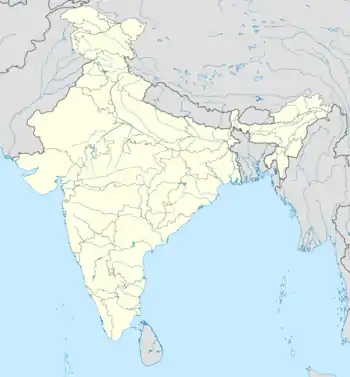Tohana
Tohana is a city and a municipal council in Fatehabad district in the Indian state of Haryana. Its name comes from the Sanskrit 'Taushayana'. It is known as a village of canals.
Tohana
Tohana | |
|---|---|
| Nickname(s): City of Canal | |
 Tohana Location in Haryana, India  Tohana Tohana (India) | |
| Coordinates: 29.7°N 75.9°E | |
| Country | |
| State | Haryana |
| District | Fatehabad district Fatehabad |
| Government | |
| • Type | Democracy |
| Elevation | 224 m (735 ft) |
| Population (2011) | |
| • Total | 63,871 [urban] 199,870 [rural] |
| Languages | |
| • Official | Hindi |
| Time zone | UTC+5:30 (IST) |
| PIN | 125120 |
| Telephone code | 01692 |
| ISO 3166 code | IN-HR |
| Vehicle registration | HR23 |
| Website | dhani%20bhakran |
Geography
Tohana is located at 29.7°N 75.9°E.[1] It has an average elevation of 225 metres (734 feet).
Communities
Tohana is located near the Punjab border. The majority of people are Sikhs, Hindus or Jains. Jaat, Jatt Sikhs, Dalits, Agrawal, and Arora clans constitute the majority of the population. Other population groups include the Saini, Jangir, and Jain Brahmans. People mainly speak Punjabi, Haryanavi, as well as Hindi.
Demographics
As per 2011,[2] Tohana had a population of 63,871 in 12,642 households. Males constitute 52.65% of the population and females 47.35%. Tohana has an average literacy rate of 67.81%, higher than the national average of 59.5%; male literacy is 72%, and female literacy is 62.54%. In Tohana, 11.99% of the population is under 6 years of age. Among children under 6, the male to female ratio is 55.48:44.52.
Tohana is two kilometres from the Punjab border in north-west Haryana. One of the neighboring cities is Hisar, 72 km away from Tohana, which was the district headquarters of Tohana until 1997. Fatehabad was created as a separate district from Hisar and Tohana was included in the part that went to Fatehabad.
History
The area around Tohana used to be a desert land until the Bhakhra Nangal sub-branch canal brought a source of irrigation for the town and neighboring villages. After this, Tohana developed into a major agricultural hub. Credit for the transformation goes to Rai bahadur Kanwar Sen Gupta, who was born in 1899 in Tohana.[3]
References
- Falling Rain Genomics, Inc - Tohana
- "Census of India 2001: Data from the 2001 Census, including cities, villages and towns (Provisional)". Census Commission of India. Archived from the original on 16 June 2004. Retrieved 1 November 2008.
- DIGITAL TOHANA Website